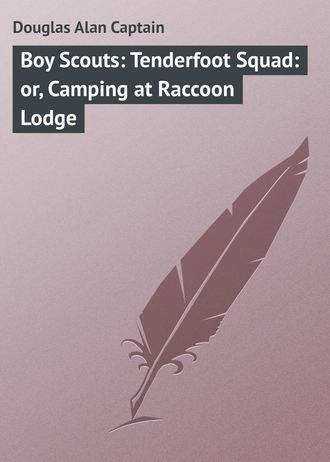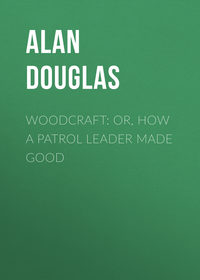 полная версия
полная версияBoy Scouts: Tenderfoot Squad: or, Camping at Raccoon Lodge
And yet Elmer did not forget to always pay attention to the course he was taking. He placed numerous landmarks down in his memory, so that he would know them again later on. Now it might be an odd freak in the way of a bent-over tree, that had the appearance of a drawn bow, with some unseen giant of the woods standing back of it, drawing the cord taut; then again a cluster of white birches would be impressed on his mind, to be readily recognized again in case the necessity arose.
All this time he was heading in a direct line toward that region where the blue spiral of smoke had been noticed in the still morning air. Elmer, too, fancied, when an hour had passed, that he must by now be drawing well along toward the origin of the smoke column.
Possibly he may have questioned whether he was exactly wise in thinking of invading the precincts of the camp, that might prove to be the home of the man who possessed the evil reputation.
"But my motives are all right," Elmer told himself, when this arose to annoy him; "and I mean no harm to Jem or his people, if so be he has any family, which somehow no one ever bothered to tell me, even if they knew. I guess Jem's been something of a mystery to the people up here. He seems to have no friends, and it may be nobody ever did penetrate to his camp. Well, then, I'll be the pioneer in the game. I'm not afraid of Jem, for all his black looks. I'd just like to get to know him, and find out if he's as tough as they say."
And accordingly Elmer, instead of taking warning from his fears and turning back, continued resolutely along the course he had marked out for himself. He would beard the lion in its den, and try to convince this same poacher Jem that he had nothing to fear from a party of boys out on a holiday. Perhaps Elmer may have also had some little scheme in mind whereby they could do more or less good by utilizing some of those superabundant stores which George had cleverly advised Rufus to lay in, under the possibility of their being storm-bound up in the woods, with a great need for much provisions. A little present of excellent tea might quite win the heart of Jem's wife, provided he had one; and Elmer had even known of a case where the fragrant odor of coffee had entirely disarmed a woods bully, who had been half inclined to clean out the camp previous to his inhaling that delicious perfume.
Now and then the boy would pause and commence sniffing the air. He knew that he had been walking directly up the wind for quite a while now, and hence more than half expected that he might catch the whiff of hard-wood smoke, telling of the presence of a fire not far distant, and dead ahead.
It was when Elmer was standing still and looking about him that he suddenly heard a sound that sent a peculiar thrill through his whole person. There was nothing so strange about the sound in itself, only the oddity of hearing it under such peculiar conditions.
"Why, upon my soul, I do believe that's a violin being tuned up!" he whispered, straining his ears still more while speaking. "Yes, it is, for I can hear the plain chords now. Perhaps some fiddler who plays at country barn dances is passing through the woods, and has stopped over night at Jem's shack. Why, he seems to have a knack for striking wonderfully fine chords, it seems to me. I'll just push on and see what it means."
This he accordingly did, and as he began to catch the sound of music more plainly as he kept advancing, Elmer found his curiosity rising to fever heat. Now the notes of the weird music came floating to him on the soft air, more and more distinctly. It seemed to the boy as though the violin fairly sobbed with the spirit of the one whose fingers trailed the bow across those taut strings.
"It's wonderful, that's what!" Elmer was telling himself for the tenth time as he kept on walking, and straining his hearing more and more. "Why, I've heard some pretty fine players, but never anything like that! Whoever can it be! I'd wager a heap that the gift of inherited genius is back of that playing. I can see that he isn't an educated violinist at all; but the notes are meant to express the language of the soul within. Oh, I'm glad now I decided to start out; because I wouldn't have missed this for anything!"
He knew that he was by now close to the spot, for the sounds came very distinctly. As he continued to advance, Elmer kept watching, wondering what manner of person he was going to see. Could some professional violinist have taken a notion to spend his summer up here amidst the solitudes, communing with Nature, so as to secure new inspiration for his work? It would not be improbable, though there was that about the playing to suggest an utter lack of training.
Now only a screen of bushes seemed to intervene. Once he had crept to the further edge of these and Elmer would be able to see the one who handled that bow so eloquently.
Three minutes later and he found himself looking eagerly out of his leafy screen, to receive a fresh shock. Instead of a man with the looks of a professor, or even a lady performer, he discovered that the party responsible for those sweet chords and sad strains that pierced his heart, was only a flaxen-haired boy not over ten years of age!
He sat there with his slender legs coiled up on a stump, and drew the wonderful notes from his fiddle without any apparent effort, just as though the music was in him, and had to find an outlet somehow. He was barefooted, and dressed shabbily. Yet, despite these evidences of poverty, Elmer could note what seemed to be a distinguished air about the lad that fairly stunned him. He thought at once of Mark Twain's "The Prince and the Pauper." Was this a real prince masquerading in dingy apparel?
He lay there and drank in the wonderful harmony for a full quarter of an hour, hardly daring to move lest his actions frighten the little chap, and cause that flood of music to cease. All the while Elmer was trying to figure out what it could mean. Was this boy Jem Shock's child; and, if so, how in the wide world could the child have come into such an amazing musical inheritance? Who was his mother, and had she sprung from some genius known to the world of melody?
"No matter what the answer is," Elmer told himself, "that child has genius deeply planted in his soul; and it will be a burning shame if he never has a chance to be educated along the right channel. I'm bound to bring this up before some of the good people at home, and see what can be done. Oh! if only they could hear him as I am doing right now, it would be easy to collect a sum of money to start him on the road to becoming the most famous of American violinists. I never heard such wonderful music in all my life. He mustn't get away from me now."
Elmer said this last because he saw that the boy was apparently about to cease playing. He had tucked his violin away in a much-soiled bag of once green baize, and was climbing down from the stump, as though to depart from the theatre he apparently liked above all other places for his daily concert.
So Elmer stepped forth and swiftly approached. The boy did not hear his footsteps at first, for Elmer knew how to tread softly; but presently he looked around and for a moment the scout leader feared he meant to dart away.
CHAPTER VII
MAKING A BARGAIN WITH CONRAD
"Hold on, please, don't go away; I'd like to talk with you, and tell you how much I've enjoyed listening to your playing."
Upon hearing the stranger say these kind words, the boy apparently reconsidered his intention of running off. He drew himself up proudly, and waited. Elmer saw that while he was a very handsome little fellow, there was no trace of weakness about his face; he had just as resolute a chin as Jem Shock himself; and his blue eyes could evidently flash fire if his spirit were aroused.
So Elmer walked forward and joined the other. Standing there barefooted, and with his clothing well worn, though neatly patched, the boy presented a strange appearance, hugging his cherished violin in its faded case close under his arm. Elmer would never forget the picture he had made as he sat there drawing all those remarkable sounds from the wooden case; he would have labeled such a painting simply "Genius," and let people catch the idea according to their bent.
"You play very sweetly, my boy," he told the other. "I have been listening for a long time. Where did you learn how to handle the bow? Who taught you to make a violin talk, and tell all the things that you have been hearing the birds and the little woods folks saying?"
"My mother showed me how to hold the bow, and the rest I just picked up like, mister," the boy replied.
Elmer was further astonished. He had expected to hear this woods boy speak most ungrammatically; but few lads of his age, who had gone to school for five years or over, could have expressed themselves one-half as well. But then the same mother who had shown him how to grasp the bow must have taken pains to teach him other things that went with the education of a growing boy. His observation had done the rest; for just as Elmer himself was accustomed to doing, this boy had ever heard a thousand voices in the solitudes where he dwelt; and these elements he was weaving into music as he dreamily drew his bow again and again across the responsive strings.
"Do you live near here?" next asked Elmer, who saw that the boy was curiously looking him over, and seemed to be visibly impressed with his khaki suit, as well as his leggings and his campaign hat.
He noticed the glint of suspicion suddenly shoot into the blue eyes.
"What do you want to know that for?" he asked sharply. "Are you a warden, or a revenue officer?"
Elmer laughed in his customary cheery way that usually proved so catching, and made him so many friends.
"Well, I should say not, my friend," he hastened to assure the other. "This is the regular uniform of the Boy Scouts. Have you ever heard of the scouts, and would you like me to tell you some interesting things about them?"
The boy looked him all over again, and when he saw what a frank and engaging face Elmer had, he seemed to make up his mind that really he ought to have no fear from so friendly a boy.
"Yes, I would, if you didn't mind telling me," he went on to say. "Once, a year or so ago, mother took me to a town to have my teeth looked over – I've got better clothes than these at the cabin, you know – and while we were there I saw a boy dressed like you are. He had a drum, and was beating it ever so hard, making music that nearly killed me, it was so terrible. But I didn't know he was a scout. So I'd like to hear about them, if you don't mind."
Accordingly, Elmer sat down on a convenient log, it being a part of the very same tree the stump of which the boy had utilized as his rostrum, when playing his sad airs to an imaginary audience.
"Come and sit beside me, please," he went on to say, encouragingly; "and first, before I start talking, I ought to introduce myself. My name is Elmer Chenowith, and I live in the town of Hickory Ridge. Would you mind telling me your name, because, you see, it's rather awkward for two boys to chat without knowing how to speak to each other."
"I'm Conrad!" the boy said simply, as he took the designated seat, and carefully placed his precious violin on the ground beside him.
"Conrad Shock?" continued Elmer, at which the boy shut his teeth hard, and then almost defiantly said:
"Yes, and Jem Shock is my father, too, if you want to know it!"
"That's all right, Conrad," the other told him. "I have heard a lot about Jem, but I don't believe much of what is told me. Besides, it's none of my business, and I don't mean to meddle with anybody else's affairs. Now I want to be friends with you. I must hear about your gift of playing, because you have got it without a question. After I've told you all about scouts, and what they aim to do in the world, I hope you'll tell me about yourself, Conrad."
"Perhaps I will, Elmer," the other replied, calmly.
So once again the story of scout craft was told in simple language. The boy hung upon every word as though he felt the keenest interest in all he heard. And never could there have been a more zealous narrator than the leader of the Wolf Patrol; for Elmer's heart was wrapped up in his present calling as typified in the khaki, and he fairly fascinated his young auditor by relating how the scouts took upon themselves so many uplifting resolutions; how they learned new things every day by observing, and remembering what they saw and heard; also how the movement was widening in its scope continually until even the Government at Washington had taken notice of its beneficial effect upon the youth of the land, and was at last legislating in behalf of the organization.
"And now," he said in conclusion, "you understand who and what we are. I have four chums along with me, two of them new beginners whom we call tenderfeet, because they know so little about the great book of Nature, and have so much to learn. We came up here, partly to camp out and enjoy ourselves as scouts always do when they get the chance. Then it happens that the father of one of the boys has bought a big tract of land around Raccoon Bluff, and his son wanted to survey it over, not being satisfied with the original work. We chanced to see your father while we were on the road, and told him this, but I'm afraid he didn't wholly believe us; but, Conrad, I give you my word of honor as a scout that we haven't the least idea of spying on him, or doing him any harm. Do you believe me?"
The boy looked him in the eye, and doubtless soul spoke to soul in that exchange of looks, for he presently said, slowly but positively:
"Yes, you could never tell a lie if you wanted to, Elmer. And I'm going to tell you that my father has been acting queer ever since he met you boys on the road. I don't know what ails him, but I heard him saying a name over and over again, and looking ever so black."
"What was the name; can you tell me, Conrad?"
"It was a funny one – Snodgrass," the boy replied, and Elmer shivered when he heard him say this, for it came to him like a flash that possibly Jem Shock might have some reason to think of that name with anything but pleasant memories.
"That is the name of the new boy whose father owns this property up here," he admitted; "but he came from some other section of the country, and has only been in our town a few months. Tell me about your mother, for you say she showed you how to hold the bow. Did she used to play the violin herself long ago?"
"Oh! no, it was her father, the celebrated player, Ovid Anderson. He is long since dead, you know. And this was his violin, too, with which he used to charm so many thousands of people. My mother has often told me how they would take him on their shoulders and march up the street shouting that he was the greatest player in all the wide world. And some day I mean to be his equal; I feel it in here," and as the boy said this most solemnly, he placed a hand on his bosom, where his heart beat most tumultuously, and called upon him for deeds worthy of the name his ancestor had made famous.
For Elmer had himself heard that name of Ovid Anderson. He remembered that the player, long since dead, had been a Swedish violinist of international reputation. How it came that his daughter should ever mate with a man like Jem Shock, and be lost to the world in this wilderness, was a puzzle too much for Elmer to understand.
But he hoped that all in good time he might find the explanation; for now that he had made the acquaintance of Conrad he was more determined than ever to meet that mother, even if in doing so he had to run the gauntlet of Jem Shock's anger.
But Conrad was showing evidences now of a desire to depart. Elmer would have liked to ask to accompany him to his cabin home, but he hesitated. Still he meant to pave the way to a future meeting, and then it might be time to ask to meet the boy's mother.
"Our camp is up on the bluff, where the road runs. You can see the smoke of our fire, and perhaps the tent under the trees, if you look that way. And we'd be glad to have you and your mother, yes, and Jem Shock, too, visit us any time, Conrad, if you felt inclined that way. Do you often come here to play the things that you feel in your soul?"
"Every morning when it isn't raining, and then the day is very long to me, for I believe I would die if it wasn't for the music," the boy hurriedly replied. "But I want to thank you for saying what you did about my father. I know people all say he is a terribly bad man, that he gets drunk, and beats us; but it's a whole pack of lies, that's what it is. He never drinks a drop. He seems to hold a grudge against the whole world for something that happened a while ago, but he is good to my mother, and he loves me, he says, like the apple of his eye."
"I'm mighty glad to hear that, Conrad, sure I am!" exclaimed Elmer. "Lots of times people are given bad names when they don't deserve them one whit. I made up my mind that I wanted to know your father, and some day I mean to drop in at your cabin and introduce myself. Yes, and tomorrow I'll be coming over here again as sure as anything, to listen to you play some more. Some day you will get your chance to take lessons from some big professor, who will fit you for taking the place your famous grandfather filled. And perhaps I may be able to start the ball rolling; you wait and see."
Conrad turned white with the wild hope that surged through his ambitious young heart. He wrung Elmer's hand eagerly as he said goodbye. The scout leader watched him going on through the aisles of the forest, and noticed that his course took him directly toward the place where the smoke came from.
Fully satisfied with the adventure of the morning, and filled with a growing ambition to be the one to interest music-loving friends in the wonderful genius of the great Ovid Anderson's grandson, Elmer turned in his tracks, and commenced to head for the camp.
"I never dreamed of such a thing happening to me, when I consented to come up here and help Rufus make his new survey," he was telling himself, as he walked on, never forgetting to note his surroundings, as a true woodsman always must, no matter what his mind may be occupied with. "And wouldn't it be a great thing, though, if we did manage to get that boy's mother to bring him down to town, so the folks who love music could only hear him play. Why, they'd go crazy over him, I'm sure, and the rest would be as easy as falling off a log."
Somehow Elmer failed to pay as much attention to animated nature around him on his return trip as he had when going out; but then that was not to be wondered at. He had really run across a most remarkable thing; and it crowded most other matters out of his mind.
When he reached camp, he found George still "up to his eyes" in work, and enjoying every minute of the morning. The fixing up of camp was such a pleasure to him that for the time being he seemed transformed into a real sociable fellow, quite different from his usual complaining self.
Elmer told him of his adventure, and George was mildly interested. He did not happen to be much of a lover of music himself, and perhaps thought Elmer might be overestimating the ability of a boy player.
"Oh! there are plenty such cropping up from time to time, I reckon," he remarked, scornfully; "but they seldom amount to a row of beans. You thought this little chap was some punkins just because you happened to hear him amidst peculiar surroundings. Now, the chances are when you listen to him in a concert hall you'll be bitterly disappointed in his genius, as you like to call it."
"You're jumping at conclusions too fast, as usual, George," the scout leader told the objector. "In the first place, Conrad will never be heard on the concert stage while he is as green as he is along the lines of musical culture. He will show what is in him to genuine critics, and then if they prove as wild over him as I believe they are bound to be, he'll be put under the charge of the best teacher in New York City, to begin along the proper lines."
As George was so busily employed, and Elmer had nothing else to do, he started getting lunch ready later on. There was an abundance of material to choose from, and it was really a pleasure to make the selection. So presently savory odors began to arise in the vicinity, that, when wafted to the olfactories of the three boys coming wearily back over their morning trail would be sure to hasten their footsteps.
It was easy to see that Rufus had made more or less progress along the lines of carrying out his plans for checking up the previous survey.
"Of course it's a whole lot too soon," he told Elmer, when he came into camp and threw himself down to rest, "to say that the job was pretty much of a bungle; but I'm beginning to believe that same. And before two suns have set I'll have the figures to prove it, too."
"What object do you suppose those civil engineers could have had in rushing it all through, and doing a rotten job in the bargain?" demanded George. "Could it be possible there was some crooked work back of the survey, and that they took a money bribe to falsify the figures? In other words, has your respected dad been stung when buying some square miles of ground up here along Raccoon Bluff?"
"Oh! I'm hardly prepared to go as far as that," said Rufus, hastily. "I'd be more inclined to believe that the men who came up here just slouched at their work and failed to do what they should. They made a slash three-quarters of the way back in one place, we found, and then probably guessed the rest. It's going to turn out a bad piece of work, and they'll hear from my dad, you can wager. The Snodgrass pluck and vim won't stand for such monkey shines one minute, as any person who knows my father can tell you."
Elmer suddenly remembered how the lad with the flaxen hair had said that his father, Jem Shock, seemed to cherish a singular antipathy toward some one by the name of Snodgrass; and that ever since meeting them on the road, he had kept repeating it to himself, and frowning as though furious. He wondered again whether that rich father of Rufus could at some time in the past have wronged the same Jem in a real estate deal. It would be very unfortunate if such proved to be the case; and might spoil some of the plans he, Elmer, had been building up, connected with the wonderful boy musician.
Later on, while they were discussing the lunch, he started in and told Lil Artha, Rufus and Alec what he had run across. All of them were greatly interested; but the scout-master, for reasons of his own, failed to mention that the man who was called a "poacher," and who had somehow gained the name of a bad man, seemed to hold hard feelings against a Snodgrass.
Rufus was loud in his desire to help the "cause" along.
"If ever you can coax these woods people to let the boy come to town, Elmer," he went on to say loftily, though also with considerable feeling, "I'll promise to interest my folks in him. And my father thinks a lot of anybody who has musical talent. I know he took a heap of pleasure in helping to send one young lady to Europe to complete her voice culture; she's now singing in opera, and thinks she owes considerable of her dazzling success to what he did for her. She's often been at our house when we lived nearer New York."
"That sounds good to me, Rufus," Elmer told him; "and if the opening comes I may call on you to redeem your promise."
At the same time, Elmer wondered whether it might not be the irony of fate if the same man who had helped "down" the father, were to stretch out a helping hand to the son. He also figured that Jem Shock would indignantly refuse to accept any aid from that source. But then the whole thing was wrapped in mystery; and Elmer, like a wise boy, decided that it would be foolish to try to figure things out until he had a better grip on the conditions.
After lunch, the surveying party, considerably refreshed by their meal, and the hour of loafing about the camp, went off again to take up the work where they had dropped it. George, too, had found some other things which he might as well do while his hand was in; and so Elmer had to cast around him for some means of passing the long afternoon away.
CHAPTER VIII
A PERIL THAT LAY IN WAIT
It was an hour and more after the surveying party had trooped forth, bearing their paraphernalia for a good afternoon's work, when Elmer happened to remember something. He was himself getting ready to take another tramp, though in a different direction than his morning stroll took him.







